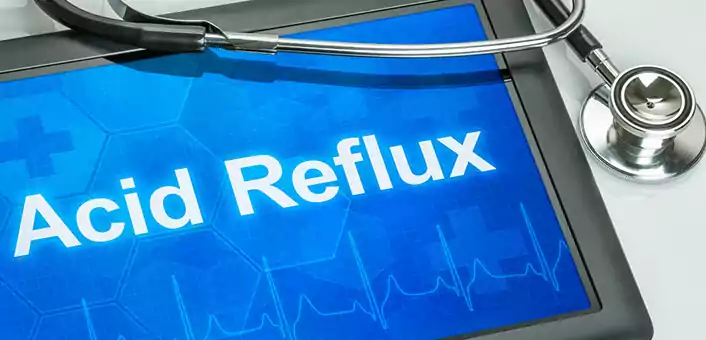PCOS test is based on the Rotterdam criteria for diagnosing PCOS.

Acid Reflux
Contrary to popular belief, acid reflux isn’t a symptom of “too much acid”. In fact, most acid reflux can be traced back to low stomach acidity. Use of PPIs and other antacids to “cure” acid reflux provides temporary relief but aggravates the problem in the long run. The best way to treat acid reflux, and thus GERD, is to have appropriate stomach acid. One tool used by doctors of functional medicine to increase good acid in the stomach is to use hydrochloric acid supplements like Betaine HCl.
Betaine HCl is the acidified form of the nutrient betaine. Betaine is an amino acid derivative (also known as trimethylglycine) that plays an important role in liver function, detoxification and certain cellular functions.
Stomach acid plays an important role in proper digestion of food and absorption of nutrients like vitamin B12. It signals the pancreas to produce and secrete digestive juices and initiates rhythmic contractions of the gut to help crush food into smaller particles. This also helps the food move through the gut. Apart from these obvious roles, stomach acid also regulates the activity of something called the lower esophageal sphincter (LES).
The LES is a muscular valve that guards the junction between the food pipe or esophagus and the stomach. When food is being eaten, it relaxes and opens to let the food enter the stomach. In presence of food, the stomach cells start secreting acid. When the stomach produces enough acid and a specific pH (chemical measure of acidity, with lower values denoting higher acidity) is reached, it gives a signal to the LES to shut tight so as to keep the gastric contents within the stomach.
If the acidity in the stomach is low (either due to biochemical problems or due to use of acid neutralizing/blocking agents), the signal to the LES is weak. The LES remains partially open, allowing the acidic contents of the stomach to “reflux” back into the esophagus and cause heartburn.
In his seminal book “Why Stomach Acid Is Good For You,” well-known researcher, author and speaker on natural approaches to diseases and wellness, Dr. Jonathan V. Wright says that “replacing HCl in people with hypochlorydia or achlorydia can be a very effective way of eliminating heartburn/indigestion/GERD and other GI symptoms, not to mention the many diseases linked with low stomach acidity.”
In a case study published in Integrative Medicine: A Clinician’s Journal, HCl supplementation has been shown to be an effective way of treating GERD caused due to hypochlorydia (low stomach acid). Low stomach acid is also known to cause small intestinal bacterial overgrowth (SIBO). It can also aggravate an H. pylori infection. H. pylori is known to be at the root of GERD due to its ability to further reduce acid production and causing fermentation (rather than digestion) of food.
We now know that low stomach acidity can be caused by long term use of proton pump inhibitors and H2 antagonists (acid blockers). In one study, published in Molecular Pharmaceutics, researchers concluded that betaine HCl is highly effective in the re-acidification of the stomach in patients who had hypochlorydia that was induced as a result of use of rabeprazole (a potent and commonly prescribed proton pump inhibitor).
Betaine HCl supplements are extremely potent and should be taken only under the supervision and guidance of a qualified medical practitioner. It is important to first diagnose whether the condition is actually a result of low stomach acidity and whether the patient will benefit from an HCl supplement.
HCl supplements should never be taken along with anti-inflammatory medication like corticosteroids and NSAIDs. These drugs may damage the stomach lining and the HCl may aggravate this damage to cause serious health complications like gastric bleeding and ulcers.
A betaine HCl pill may lodge in the esophagus in areas where there is a scar tissue or an area where the esophageal tube has narrowed due to age. It may then rapidly dissolve in this area and literally burn it up. It can cause a severe sharp pain. It is better to break the pill into smaller pieces and gulp it with sufficient amounts of water.
A per meal dosage of 2500 mg of betaine HCl is sufficient to establish adequate stomach acidity. However, higher dosages (6000 mg) may be required in certain cases initially. The dosages can then be decreased gradually. Once again, please note that the right dose for you may be best decided by your doctor.
Betaine HCl supplementation should be taken only for a short duration until adequate stomach acid levels have been reached and only under the supervision of a qualified health practitioner.
It is advisable to take betaine HCl along with pepsin. In people with low stomach acid, pepsin production is impaired, leading to improper digestion of proteins. HCl replacement therapy works better with pepsin than without it.
Under normal circumstances, short term betaine HCl supplementation is safe and without any side effects. However, it does carry its own risks, especially in people who have health complications caused by high stomach acid. Such conditions may get aggravated (gastritis and ulcers, for example). The course of therapy should be carefully monitored by an expert and at the first signs of any discomfort, supplementation must be stopped.
Making your stomach as acidic as it needs to be, to digest food, is an effective way to treat many GI problems, including acid reflux. However, HCl replacement therapy should be done for only a short duration. HCl supplementation therapy, although safe, may prove to be an aggravating factor in certain underlying problems (gastritis and ulcers) and thus requires continuous monitoring by a qualified health practitioner.